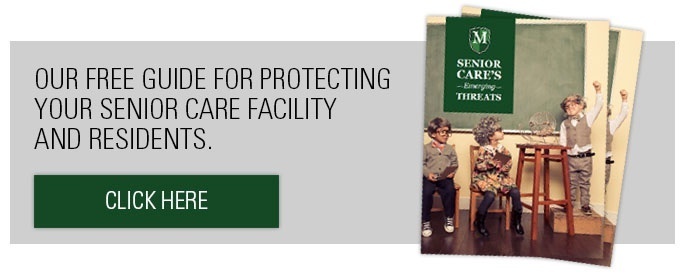Whether rightfully so or not, senior care facilities often find themselves on the wrong side of a lawsuit. The residents of these facilities are typically elderly individuals, many of whom are reliant upon nursing staff to assist them with their everyday tasks, like eating or bathing. Due to the nature of this environment, employees at senior care facilities must tread carefully in every action they undertake to help the residents.
Having the right insurance protections in place are crucial for senior care facilities when faced with a litany of potential accusations over medication errors, neglect, abuse and skimping on patient care to boost profits. Senior care insurance provides the essential security for these facilities when faced with a sobering allegation or troublesome lawsuit.
Even though many industry groups and nursing home operators lament that the majority of the lawsuits filed against them help the attorneys filing the cases more than the residents, the fact remains that these claims are inevitable nowadays. Without the right insurance protections in place, these lawsuits can spell disaster for any senior care facility.
A rising population
As baby boomers move into the retirement phase of their life, and chronic diseases and conditions leave many of these individuals unable to care for themselves, senior care facilities have been growing in popularity as a viable option for providing the assistance they need. According to The Wall Street Journal, 1.4 million Americans currently reside in a nursing home. Further, nearly 20 percent of the U.S. population, or 72.1 million individuals, will be 65 or older by 2030.
With the median age of Americans continuing to increase, senior care facilities will play an even larger role in offering a stable, comfortable environment for elderly individuals in the twilight of their life. Because of this, it’s important that these facilities have the security in place to ensure they can provide this crucial service for seniors.
“It falls on the senior care facility to ensure they administer the appropriate medication to the right person.”
Medication errors
Since the residents of senior care facilities are often suffering from a variety of physical maladies and illnesses, medication dispersal plays an important role in the daily operations. While many of the residents are perfectly capable of remembering to take their own medicine, many of these elderly individuals are unable to perform this crucial duty. Because of this, it falls on the senior care facility to ensure they administer the appropriate medication to the right person.
While many senior care facilities will have skilled nursing staff, or maybe even an in-house pharmacist at some of the nicer ones, many of these institutions must rely on their own employees to administer medicine to the staff. Even in the most controlled circumstances with the best trained staff possible, there is always a chance that something can potentially go wrong with the medicine dispersal.
Giving a resident the wrong pills, too much medication or not enough of it can lead to tragic outcomes. As noted by the Department of Health and Human Services Office of the Inspector General, Medicare beneficiaries staying at a senior nursing facility who suffered from medication-related adverse events was much more common than previously believed, and nearly half of these could have been prevented.
However, not all medication errors are due to a mistake on the part of the senior care facilities’ staff. The physician prescribing the medicine, the pharmacist bottling the pills or the family members who insert themselves into the equation can all contribute to a medication error. Unfortunately, the senior care facility is often the first target in a lawsuit arising from the injury or death caused by a medication error.
 Due to the high number and large variety of medications many seniors must take, it raises the possibility of an error.
Due to the high number and large variety of medications many seniors must take, it raises the possibility of an error.Neglect
Providing quality care for residents is the ultimate mission statement of any senior care facility – so much so that it’s in the name. Falls, broken bones, bedsores and even abandonment can all occur to an individual residing at a senior care facility.
By law, these facilities are required to provide a safe environment for its residents. This can pose difficulties, since many elderly individuals might be unable to stand or move under their own agency. Providing a safe environment requires staff members to ensure all residents are not only bathed, groomed, fed and properly medicated, but also that they are free of problems associated with immobility or illness.
Abuse
Unfortunately, elder abuse is an all too common in the world of senior care. Despite carefully screening applicants for employment and implementing internal policies aimed at preventing abuse, this is a problem that plagues this industry. When a resident or a family member accuses a senior care facility of abuse, it’s a serious allegation that must be dealt with immediately in a respectful and responsible matter.
Finding the right partners
Brokers who partner with McGowan Program Administrators for Senior Care Insurance gain an unrivaled resource to assist in the lawsuits and claims leveled against these facilities. With our “Power of the Pen,” we create specially tailored policies with primary medical and general liability limits between $1 million and $3 million. In addition, we offer special features that include sexual abuse liability, evacuation, HIPAA and data breaches. With coverages available nationwide, managers and owners of senior care facilities can rest easy at night when they think McGowan.



